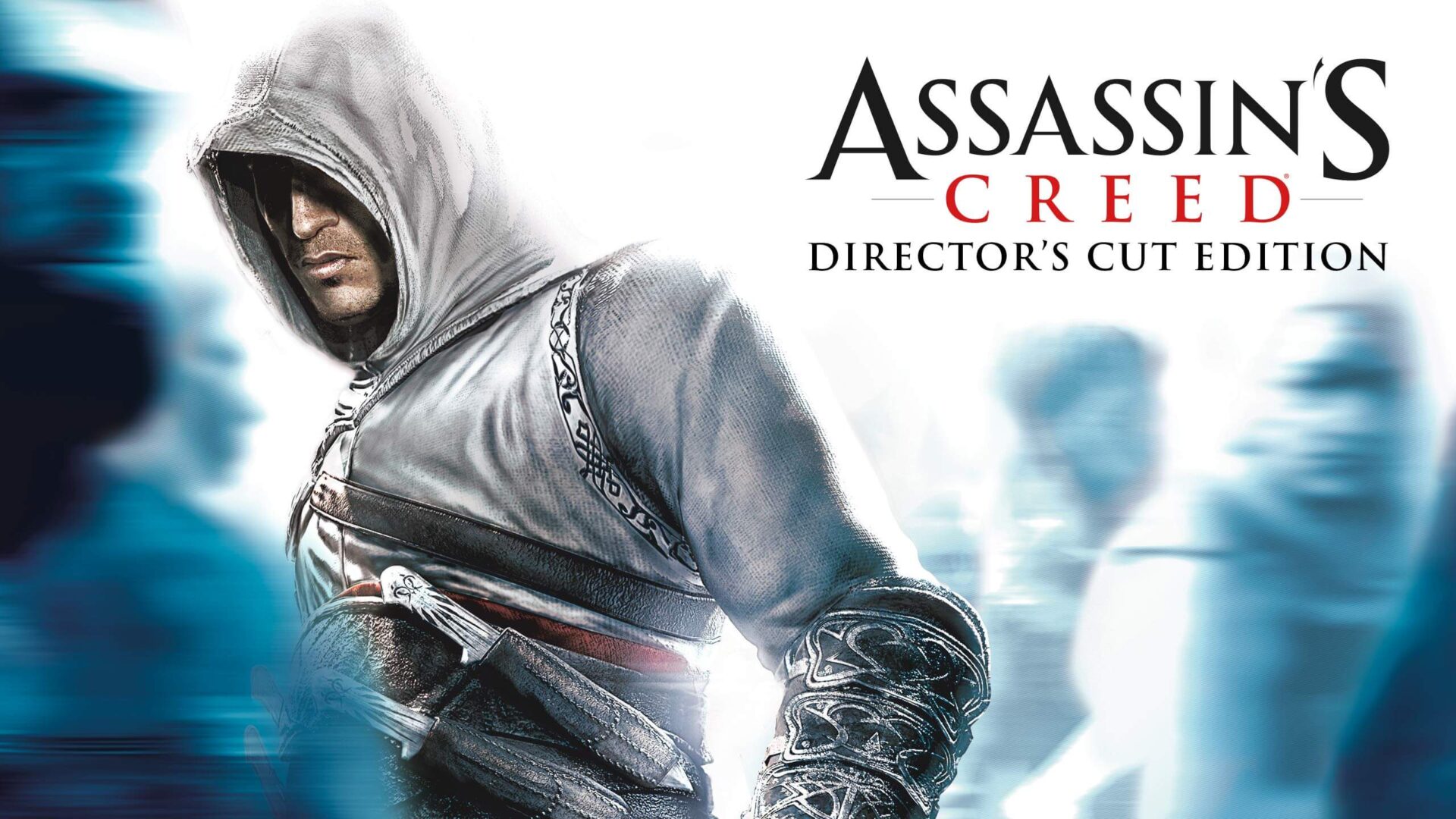
Whenever people learn I write video game reviews from the Catholic perspective combined with the knowledge of my education as a history major, they almost always ask if I have reviewed or at least played Assassin’s Creed. Despite what my background might suggest I never had that much interest in the Assassin’s Creed games since most of the discussions I heard about the series were about how it was oversaturated and repetitive in the same vein as something like Call of Duty. Regardless, this question has been a persistent thorn in my side for a while now and as the existence of the review implies I finally decided to satiate my audience’s curiosity and play Assassin’s Creed.
The original Assassin’s Creed game was conceived as a spin-off of the Prince of Persia series, but by the time it was first released in 2007 the connections to Prince of Persia had been abandoned. For this review I played the PC-exclusive Director’s Cut Edition of the game which adds new missions types to give the game a bit more variety. Though I don’t have any experience with the original version to compare it to I can say the game definitely felt less repetitive than I was expecting so I guess it’s safe to assume the improvements succeeded. The only drawback to the PC version is that if you want to use a traditional controller as opposed to a keyboard and mouse you have to set it up manually which is a very strange oversight for a game originally made for consoles.
The strongest aspect of Assassin’s Creed is without a doubt its gameplay. Stealth is the first and most important pillar of the game as Acre, Damascus, and Jerusalem are crawling with soldiers on the lookout for suspicious activity. Striking a balance between moving quickly between objects and remaining inconspicuous felt very immersive and even exciting at times. Moving slowly through crowded streets, jumping across rooftops, and sneaking up on a target unseen is quite the rush if you manage to pull it off.
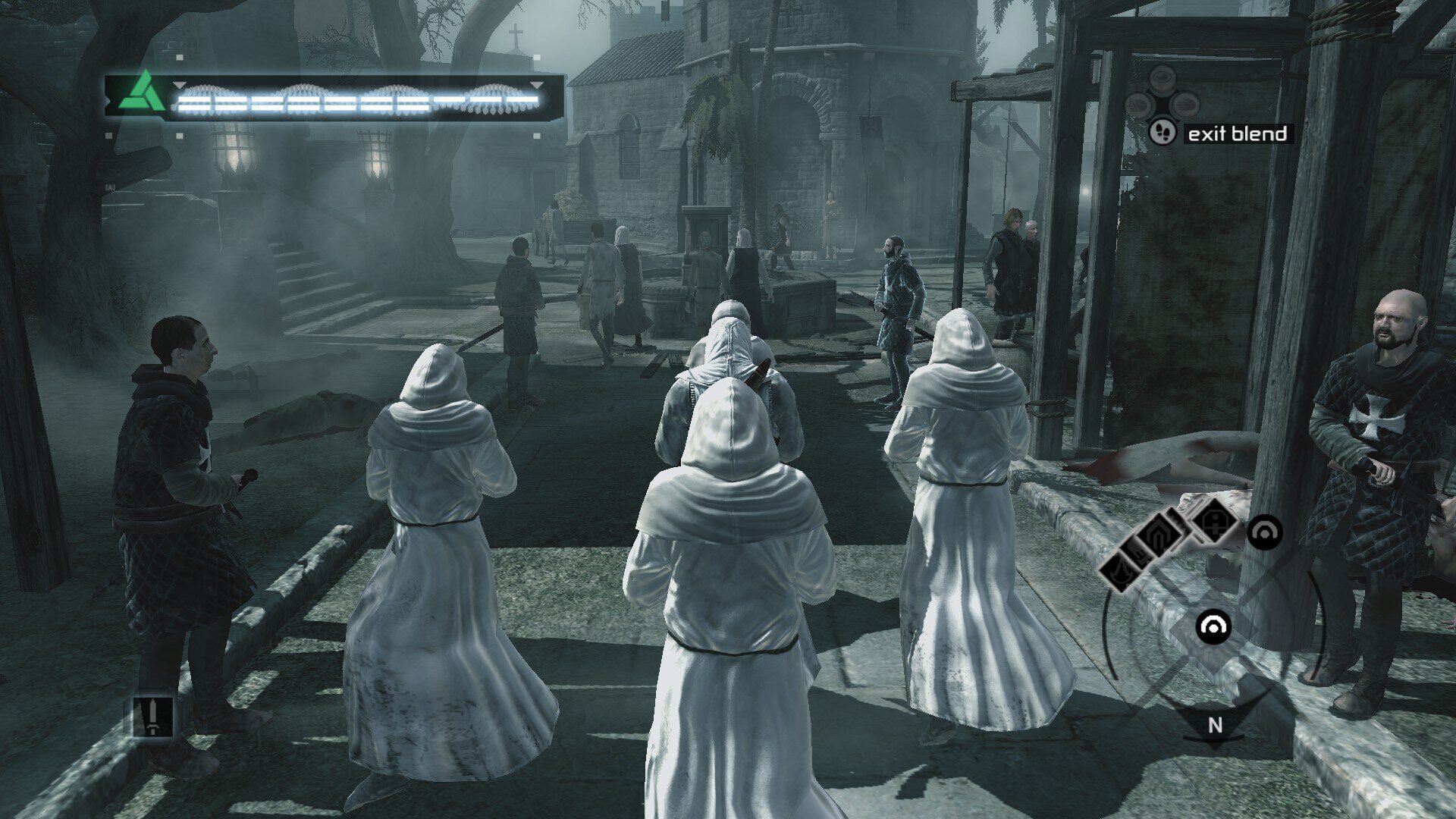
Nothing to see here boys! Just a group of monks doing God’s work.
The stealth is complemented by the open ended nature of traversing the 3 cities. Pretty much every building you can see can be climbed from multiple directions creating opportunities for an almost open-world sandbox style of exploration. This pillar of the game is further encouraged through the use of collectable flags scattered about the Holy Land just begging the player to take a trip off the beaten path and explore their surroundings for a bit, even if the flags don’t actually offer much of a tangible reward.
Combat is the last of what I would consider the main pillars of gameplay. Unfortunately, it’s also one of the game’s weaker aspects as most enemies don’t provide much of a challenge. Overwhelming the enemy’s defense by mashing the attack button or spamming the heavy strike will usually get the job done against most grunts, but as the game progresses and the player learns how to counter attack even tougher enemies are largely trivialized. All of this is not to say the combat is devoid of any fun because it certainly can be, but only in small doses which is why I always made stealth my first approach in any given situation.
Against all odds I can confidently say I had a great time with Assassin’s Creed in terms of the actual video game, but from here on out it’s all downhill from here. The game’s visuals are a mixed bag to the least. On one hand the virtual recreation of the Holy Land is amazing with famous landmarks such as the Dome of the Rock and the Church of the Holy Sepulchre being an absolute joy to digitally behold. On the other hand the character models have aged terribly with muddy textures that ruin any attempt at photorealism and fall face first into the uncanny valley. Imagine a handcrafted model city populated by cheap Mattel dolls and you get Assassin’s Creed.
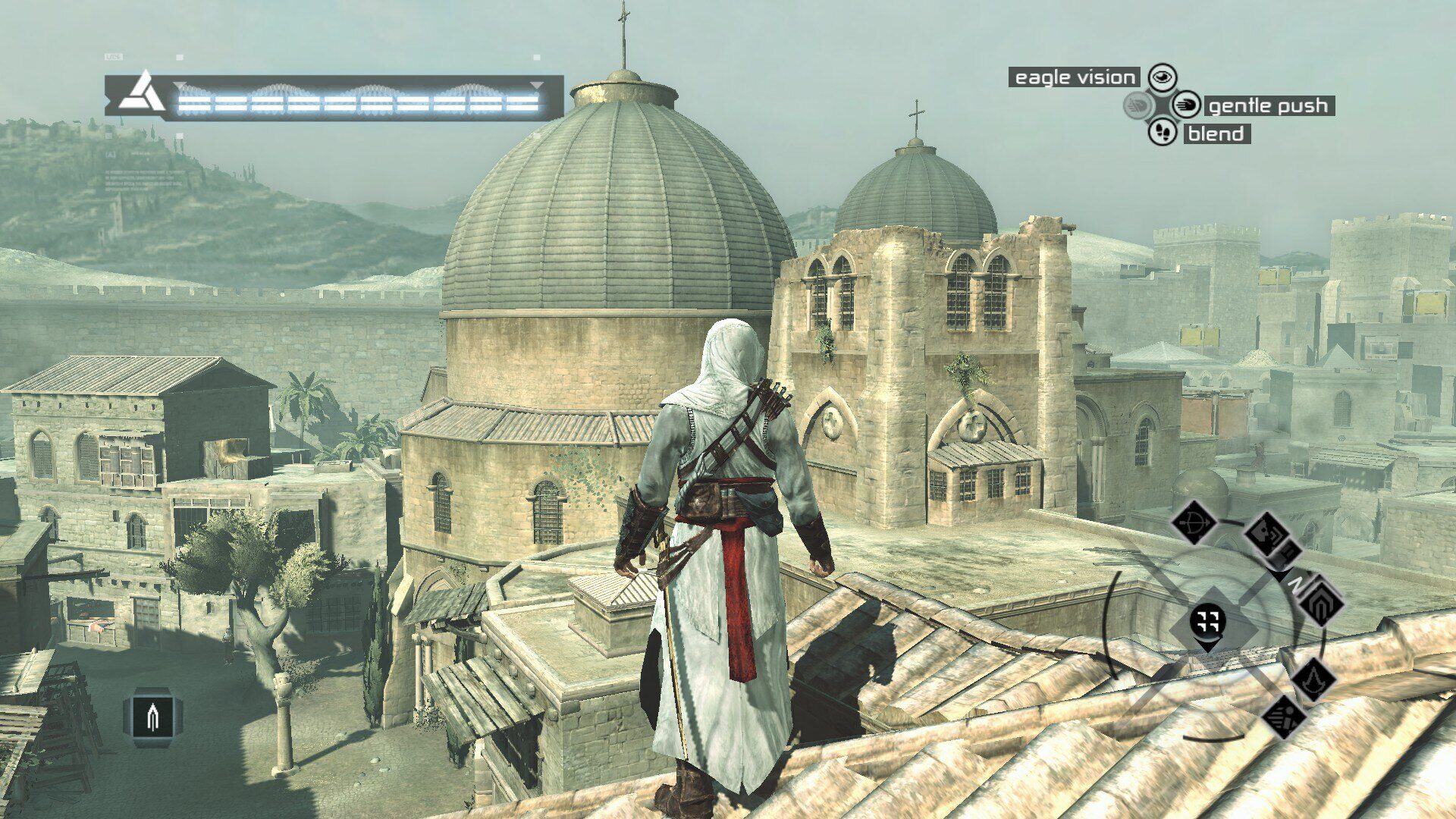
The Church of the Holy Sepulchre. The site of our Lord’s death and resurrection.
The game’s sound design misses the mark in many areas as well. The general volume of the game is too low, forcing me to turn up my computer’s output much higher than I usually would. Additionally, the music and sound effects often drown out the voice acting which is a huge problem in a game with no option for subtitles. The music is also woefully unremarkable with generic movie score-esque compositions that don’t add much to the proceedings. I wouldn’t call these auditorial mishaps deal breakers, but I still expect better from a big name publisher like Ubisoft.
Finally there’s the story, the moment you’ve all been waiting for and the one I’ve been dreading. The story begins in the modern day when an ex-Assassin named Desmond is kidnaped by Dr. Vidic of Abstergo Industries, a corporate front for the Knights Templar. Using a machine called the Animus, Dr. Vidic forces Desmond to relive the memories of his genetic ancestor in order to learn the whereabouts of a lost artifact. I assume this framing device for the player’s adventures in the Holy Land was to make the “gamey” elements of the experience like opening menus or respawning after death feel more diegetic, but I found it completely unnecessary. Nothing really happens in the modern day other than Desmond swapping sarcastic banter with the cryptic Dr. Vidic, so why not cut out the middleman and let suspension of disbelief handle the rest?
The ACTUAL story follows an Assassin named Altair during the Third Crusade as he seeks to redeem himself after breaking all 3 tenets of the Assassin’s Creed and compromising an important mission. Altair must hunt down 9 men, both saracen and crusader alike, in a veritable who’s who of the Third Crusade while discovering the conspiracy motivating the Knights Templar along the way. Though the plot might sound decent enough on paper, in practice it is probably the most revolting story I have ever had the displeasure of experiencing in a video game. It is the perfect storm of propagandistic historical revisionism, blasphemy of the highest order, and morally abhorrent philosophical messaging.
Let us begin with Assassin’s Creed’s titular protagonists. The Assassins were a radical sect of Shia Muslims founded in 1090 to disrupt the dominant Sunni Muslim powers. Being a minority of a minority in the Muslim world, the Assassins did not have enough political influence to rally large armies to oppose Sunni rulers. Instead of the direct approach, the Assassins chose to infiltrate their target’s inner circle and murder them after gaining their trust. Almost every politically motivated murder in the Holy Land and other parts of the Middle East was attributed to the Assassins at the time and eventually the term “assassination” was coined to describe their favored method of attack. The Assassins were destroyed in 1256 when their headquarters in Alamut were captured by the Mongol Empire, but it would be disingenuous to say they didn’t leave their mark on the pages of history, which makes their depiction in Assassin’s Creed all the more disappointing.
In the game the Assassins are completely divorced from their religious origins to the point where they feel like a secular order who exists only to stop the Templars. I’ve heard it said that to be defined by your enemy is to be nothing at all and considering how boring the video game Assassins are compared to their historical counterparts I think it’s safe to say there’s something to that statement. Furthermore, as fun as it is being a parkour expert who fights like a hollywood ninja it obviously does not reflect the meticulous, multi-year process of infiltrating your target’s inner circle before moving in for the kill used by real Assassins.
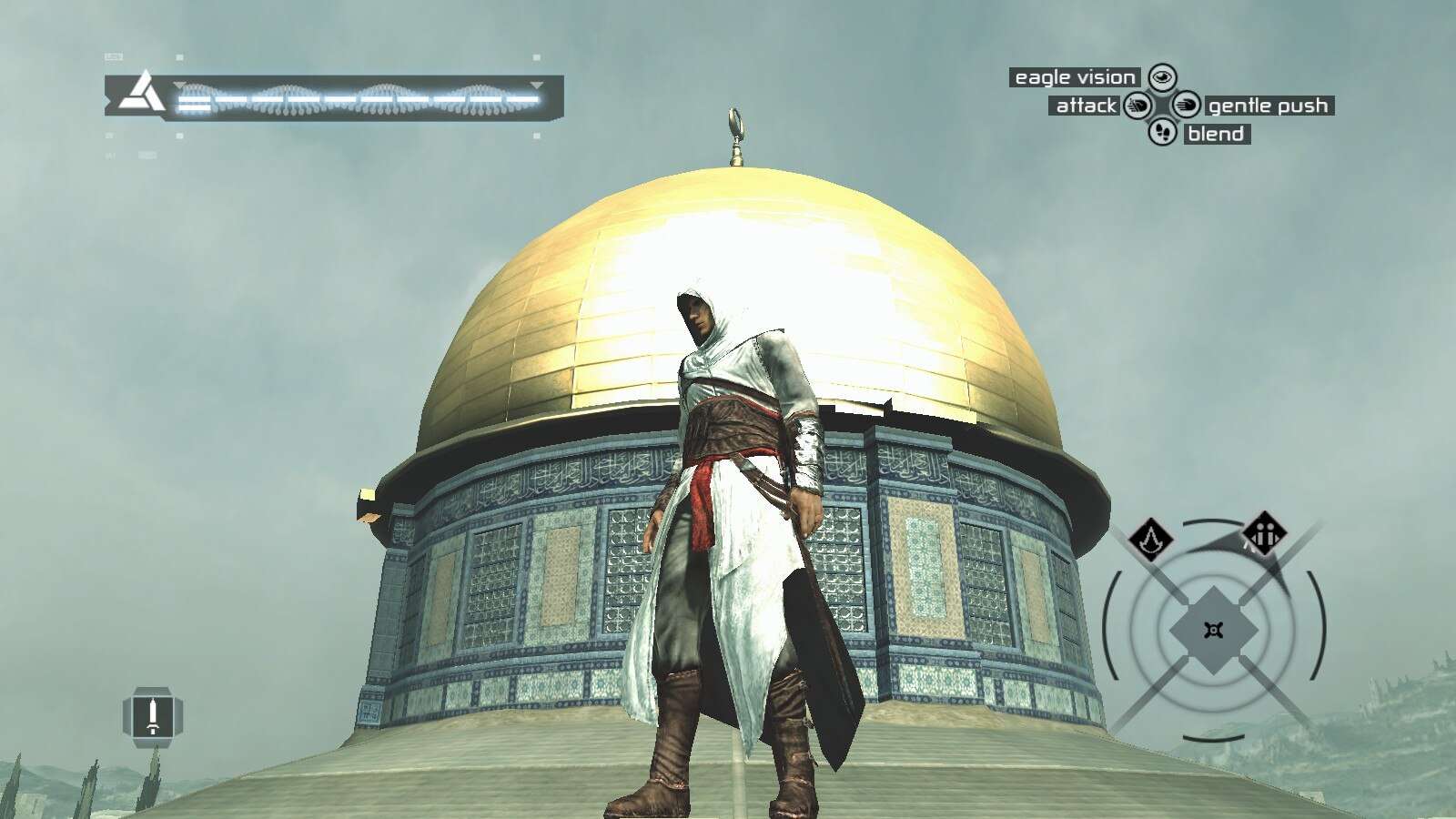
If you happen to be in Jerusalem, please do not climb The Dome of the Rock. I’m sure it looks just as grand from the street as it does from the roof.
Moving onto the game’s antagonists, the Knights Templar were an order of warrior monks founded shortly after the First Crusade in 1099 to protect the Holy Land. They were similar to other monastic orders like the Benedictines in that they took vows of poverty, chastity, and obedience, but where they differed is in their military functions of protecting pilgrims and holy sites, building and maintaining fortifications, and fighting alongside other crusaders in times of war. The Templars very quickly became one of the most powerful fighting forces in all of Christendom not only because they attracted large donations and new recruits for their noble cause, but because of the rigorous discipline that came with their lifestyle which couldn’t be matched by secular armies. They also organized themselves to take advantage of each Templar’s individual strengths with Knight Brothers coming from the nobility constituting the main cavalry force, Sergeant Brothers being peasants who served as squires or infantry, and Turcople Brothers who were of Eastern Christian or Asiatic ancestry and utilized fighting techniques not practiced by Western Christians such as mounted archery. Outside of combat the Templars were also unique for their knowledge of local languages and customs that allowed them to represent the Crusader-States in foreign courts.
The Templars fiercely defended the Holy Land for 200 years until the loss of Acre in 1291, but the real death blow came when the King of France, Philip IV, arrested and executed the order’s grand master, Jacques de Molay, along with all other Templars in France on false charges of heresy, witchcraft, and treason in order to secure their considerable assets for himself. Not the most dignified end for a once great order of warrior monks, but the following centuries would prove to be even worse because despite being one of the most well documented organizations of its time, the loss of the order’s central archive(most likely destroyed by the Ottoman Empire) became a breeding ground for conspiracy theories and historical revisionism that dominates Templar-related literature to this day.
On that note, the Knights Templar in Assassin’s Creed, much like the Assassins, have been completely removed from their religious origins and take on a role more akin to something like the Illuminati. They have members among some of the most powerful and influential men on both sides of the Third Crusade, manipulating the war to their own ends. This is absolutely nonsensical not only because the Templars obviously only ever fought on the side of Christendom, but also because the game tries to make completely separate Christian orders like the Knights Hospitaller and the Knights Teutonic directly subservient to them. Though this depiction might align with many popular myths surrounding the Knights Templar, historically it is a disaster from top to bottom.
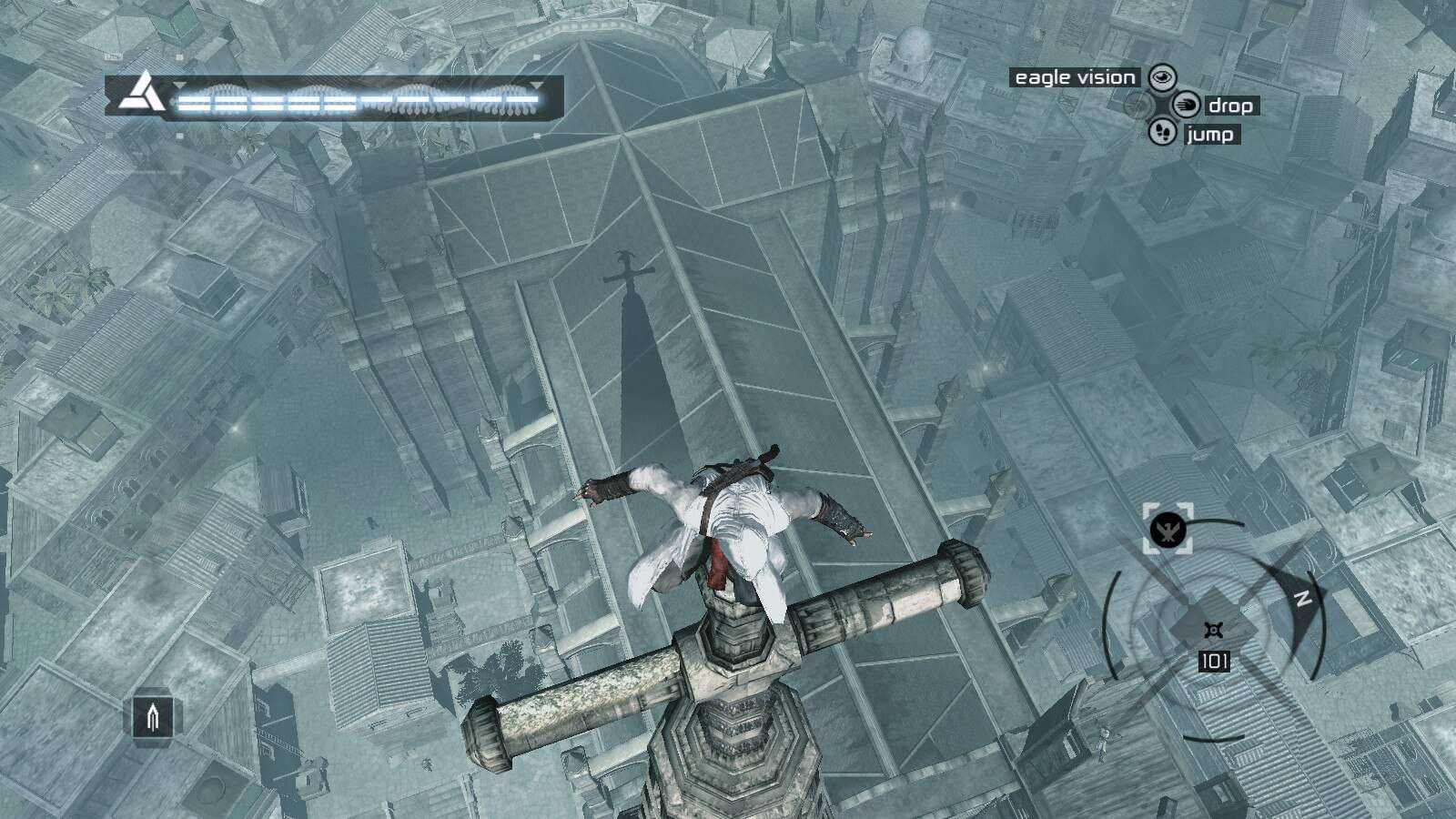
The Gothic Cathedral found in Acre is out of place in the Third Crusade. This architectural style was only just getting started in Europe so there’s no way it would have reached the Holy Land this quickly.
Outside of Assassin’s Creed’s starring roles, there are other smaller instances of historical revisionism that I think are worth mentioning. In the Muslim controlled cities of Damascus and Jerusalem a town crier can be heard railing against the crusaders as uniquely violent and ignorant enemies of Islam, but this sort of rhetoric would not have been used in the Muslim world until after World War I when western powers introduced the idea of Christian Holy War into Muslim education as they rebuilt the Middle East after the fall of the Ottoman Empire. At the time of the Crusades, violence was not uncommon in the Holy Land as various Muslim warlords constantly struggled with each other for more power. When the crusaders showed up the Muslims thought next to nothing of them, just another contender in an ongoing power struggle.
I also want to briefly touch on the depiction of King Richard I, better known as Richard the Lionheart. At first I was pleasantly surprised by the English monarch as his personality seemed to match everything I’ve read about him in my research, but my moment of respite in this godforsaken video game was dashed in an instant when he made a rather cynical comment about humanity being violent by nature. This is insulting because a pious Catholic like Richard would never have held such views about the nature of the human person, especially in an era where religion preceded almost all other aspects of daily life. Humanity has been stained by original sin, but at the core it is still created in the image and likeness of God and therefore inherently good natured. I point this out because it shows even in the moments when Assassin’s Creed actually gets somewhat close to the truth it still manages to fall short at the last second.
The final nail in the coffin for Assassin’s Creed comes in the form of the macguffin pursued by both the Assassins and Templars which drives the narrative forward. The Piece of Eden is a silver sphere with the ability to create powerful illusions that enthrall the minds of those who witness them. The game tells us this artifact is what allowed Moses and our Lord Jesus Christ to perform the miracles recorded in the Old Testament and New Testament respectively. Effectively this plotpoint denies both the divinity of Jesus Christ and more broadly the existence of God. Never in my entire time as a gamer have I seen a game so openly malicious towards Catholicism. The game also implies Islam is just as illegitimate, but never as directly or explicitly as Christianity. So not only is Assassin’s Creed brazenly blasphemous, but it does so while implementing a double standard.
Beyond the sickeningly sacrilegious historicity, Assassin’s Creed also imparts a convoluted and ultimately incoherent philosophical message. The game’s thesis statement is a phrase uttered by the Assassins: “Nothing is true, everything is permitted.” The phrase comes from the 1938 novel Alamut, one of the game’s main creative influences. I think most people would agree that this statement is clearly just moral relativism justifying absolute freedom, as does the game’s protagonist, Altair, at the beginning of the story. By the end of the story however, the game tells us the true meaning is not absolute freedom, but absolute wisdom. Altair explains it something along the lines of: “There is no divinity, reality is an illusion, and the only way to overcome the illusion is to act through reason.”
The first problem with this revelation is that nothing in the game’s story leads up to this conclusion. Altair jumps from “absolute freedom” to “action guided by reason” without any signs of an in-between stage where he’s working things out. He gets a few cryptic statements out of his assassination targets before killing them and then goes back to his master demanding explanations who rarely gives him a straight answer. The second problem is the idea that reality is an illusion only reason can overcome which has been historically proven as an unsustainable philosophy. During the French Revolution the Catholic Church was violently removed from the country and replaced with a new religion that was more compatible with revolutionary ideals called the Cult of Reason. However, within a year of its foundation the cult was changed from an atheistic religion to deistic religion, rebranding itself as the Cult of the Supreme Being. Even when completely devoted to reason alone the necessity of God’s existence was inescapable.
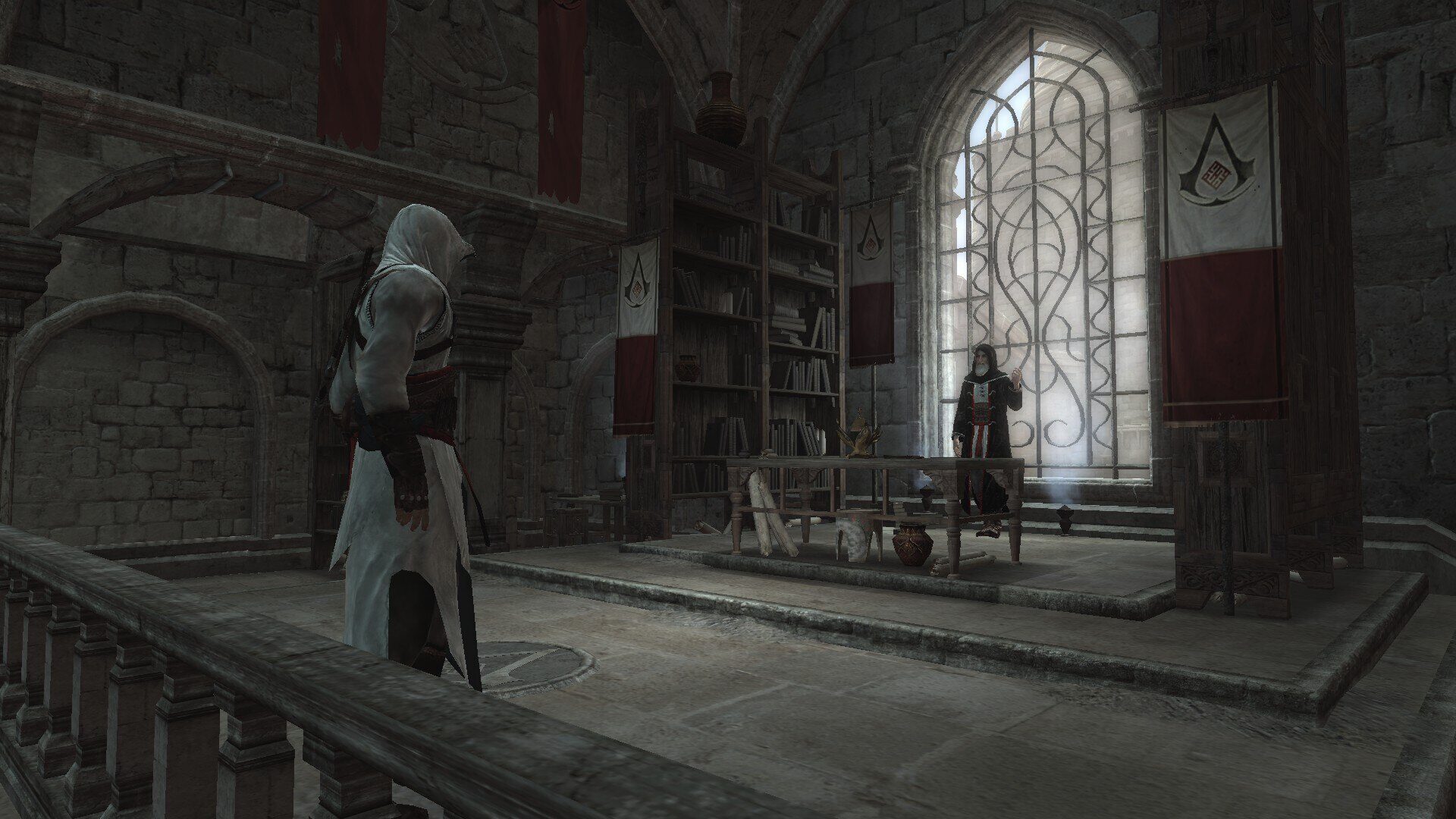
The Old Man of the Mountain. Master of the Assassins and mouthpiece of philosophical nonsense.
Assassin’s Creed has left me conflicted to say the least. When taken apart from everything else the gameplay holds up exceptionally well, but the package as a whole drags it down quite a bit. The story in particular is so egregiously awful that I’m tempted to outright dismiss the entire game because of it. With that in mind my final recommendation would be to familiarize yourself with the history of the Crusades from sources backed by reputable scholarship before playing Assassin’s Creed. Enjoy the experience, but never lose sight of the truth.
Scoring: 52%
Gameplay: 5/5
Visuals: 3/5
Sound: 2/5
Story: 1/5
Replayability: 2/5
Morality & Parental Warnings: Assassin’s Creed is an open world stealth game in which the player is tasked with hunting down and assassinating historical figures in the Holy Land during the Third Crusade. Stealth can be used to avoid most conflicts, but some killings are unavoidable. Characters bleed when they are hurt or killed, but there is an option to turn off the blood in the game’s menu. There is strong language within the game’s dialogue. The game’s story uses a fictional artifact as “proof” that God does not exist and is openly cynical or even hostile towards Christianity and other religions. Despite its historical setting, hardly anything about Assassin’s Creed can reasonably be described as historically accurate. The game’s philosophy is extremely relativistic, denying the existence of objective truth.
